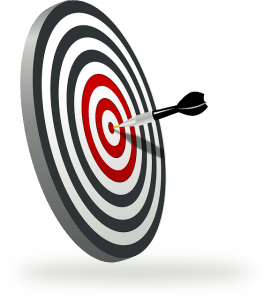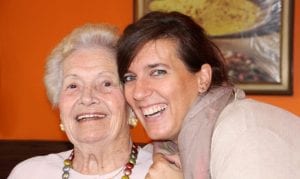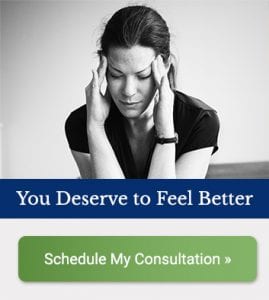Protect Your Sleep Like Your Life Depends on It!
 That’s right: protect your sleep like your life depends on it. Your life does depend on your sleep. Good, quality sleep helps prevent breast cancer and Alzheimer’s disease, both of which run in my family. So, I am proactive about my sleep quality, and as a Functional Nutritionist I encourage my clients to monitor and protect their sleep as well. Here’s how I approach sleep:
That’s right: protect your sleep like your life depends on it. Your life does depend on your sleep. Good, quality sleep helps prevent breast cancer and Alzheimer’s disease, both of which run in my family. So, I am proactive about my sleep quality, and as a Functional Nutritionist I encourage my clients to monitor and protect their sleep as well. Here’s how I approach sleep:
1. Monitor Sleep
I monitor sleep with my Oura ring. It tracks when I go to bed, how long it takes me to go to sleep, and how many minutes I spend in deep, light or REM sleep. It even tracks if I wake up and how long it takes to go back to sleep. (Check out Oura ring here, and use the coupon code “kristy10” to get a 10% discount on your purchase.)
I have zero problems going to sleep. My biggest problem is getting deep sleep, and with my family history of Alzheimer’s disease, you can bet I want to improve that marker! Step one is knowing how well you sleep. If you don’t know your quality of sleep, you don’t know what you need to work on.
2. Practice Good Sleep Hygiene
These are the sleep hygiene tips I share with my clients:
- Avoid all screens two hours before bedtime. This includes TV, phone, computer and tablet screens. The blue light they emit blocks your body’s production of melatonin. Melatonin helps control your sleep cycle. (Read more about melatonin here: https://www.sleepfoundation.org/sleep-topics/melatonin-and-sleep.)
- Go to bed about the same time every night. Routine is key to programming your circadian rhythm (your internal clock).
- Include in your bedtime routine taking a hot bath with lavender Epsom salts, which are available at most grocery stores. Not only will the bath and lavender support sleep, but the Epsom salts will help relax tense muscles and will support detoxification. Use 2-3 cups per bath.
- Quiet your mind, pray or meditate each evening. This will lower stress hormones and also boost production of melatonin.
- Sleep in a dark, cool room. Consider blackout shades to get your room dark. Keep the temperature around 67 degrees Fahrenheit while sleeping.
- Don’t put your cell phone by your bed. Keep it in another room. The electromagnetic field (EMF) may disrupt your sleep. I unplug my WiFi when going to bed to reduce EMF exposure and I recommend you do, too.
- Note that the Oura ring does operate with Bluetooth, but that can be turned off; the data is still stored and will sync with the app once the Bluetooth is turned back on. https://ouraring.com/faq/
- Expose your eyes to bright daylight early in the day to shut off melatonin production and, in that way, increase production at night. I like to start my day before the sun comes up by sipping a good cup of Purity coffee and working on client reports.
- Avoid coffee after lunch and completely avoid alcohol. Both disrupt sleep, especially alcohol, and it is simply not worth the risk. I confess that I don’t follow this rule on a daily basis. I am married to an Irish man and he loves his whiskey! I limit the days I drink, and only have a half or less of whatever he serves. If you’re a coffee drinker, switch to Purity Coffee. It has the highest anti-oxidant content. Each cup is like a mini-vitamin. Did I mention how delicious it is? You’ll love it!
3. Interventions
 If you struggle to get the high-quality sleep that fights disease and helps you feel ready to tackle whatever life throws your way, it’s time to go to the third step, interventions.
If you struggle to get the high-quality sleep that fights disease and helps you feel ready to tackle whatever life throws your way, it’s time to go to the third step, interventions.
If you have identified a problem that is keeping you from good sleep, such as restless leg syndrome or leg cramps, give me a call. These conditions, and many others, can be related to nutrient deficiencies that we can identify and fix.
Nutrient deficiencies can also drive sleep disruptors such as racing brains, difficulty falling asleep due to an imbalance of brain chemicals or trouble dragging yourself out of bed. (Yes, nutrition even helps balance brain chemicals! YAY!)
The takeaway here is if you have a defined sleep problem, whether it’s too much or too little sleep, targeted nutrition intervention can often help.
4. Autonomic Nervous System and Sleep Health
If you’re still struggling with sleep after covering the above, it’s time to address the autonomic nervous system. The autonomic nervous system is made up of the sympathetic and parasympathetic nervous systems. Good nutrition helps to support balance here, but sometimes the balance is disrupted, and we can get stuck in a chronic stress response. Fortunately, there are lots of techniques to restore balance. Some are easy to do at home while others require professional help.
- Deep breathing is a great place to start. I teach clients in office to do the “Flapping Bird” technique. With your arms down at your sides, start by slowly breathing in and raising your arms to straight over your head to a count of 5. Hold your breath for a count of 5. Then slowly release your breath and drop your arms back down to your side to a count of 5. Immediately start the next breath. Repeat this five times each session, and aim for five sessions per day. There is another effective technique that involves inhaling through one nostril and exhaling through the other nostril. See which technique works best for you.
- Tapping is an easy technique to learn and is helpful for some. You tap on the meridian points used in acupuncture while repeating phrases of affirmation. Contact Angela Clark for coaching in effective tapping techniques.
- Take long walks in nature, preferably in trees. This reduces stress hormone levels and restores autonomic nervous system balance.

- Acupuncture has been helpful for me. When I first started measuring sleep quality, I rarely had more than 1-5 minutes of deep sleep per night. After a couple of sessions with an acupuncturist, my deep sleep got into the teens on a consistent basis. That’s good improvement.
- Neurofeedback is an approach to try when the easy at-home approaches aren’t working. This is a therapy to use when chronic stress is firmly rooted in your life. I’ve used neurofeedback in the past when I had prolonged trauma, and it was amazingly effective. I’m starting back to see if it can help my sleep quality even more. I’ll keep you posted on the results.
- The final approach is HeartMath. This approach helps you measure your physiological responses to events and people throughout your day and guides how you manage your response. The result is reduced stress response and increased heart rate variability, another marker of health status.
Don’t try to do all of this at once! That can be overwhelming and ADD stress, which kind of defeats the whole purpose.
Rather, I encourage my clients to start with one or two that seem like the easiest for them to implement. Keep in mind that what is easy for you may be hard for someone else. So, look them all over and pick one. Certainly don’t stress about which is the best (there is no one best) or getting them all done. This is not an example of “all or nothing”!
Once you have successfully incorporated an intervention into your life, continue to add more until you are consistently getting optimal sleep.
Your healthy 80-year-old self will thank you!

